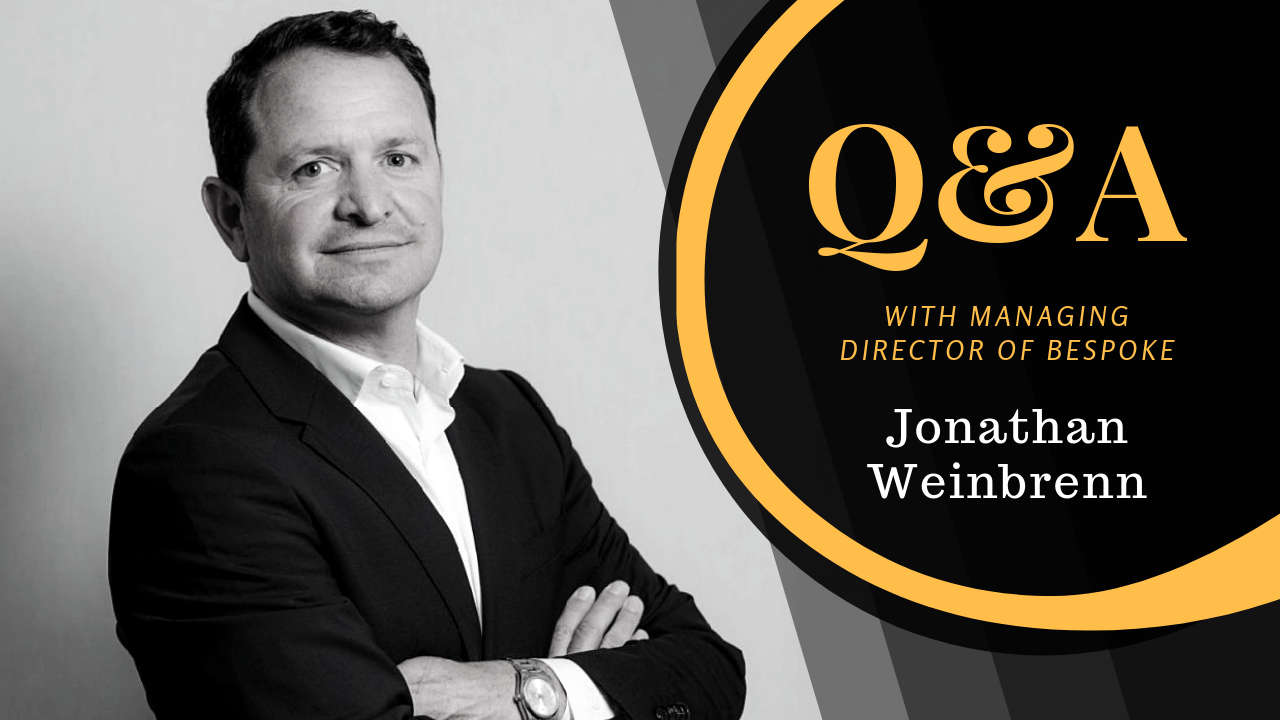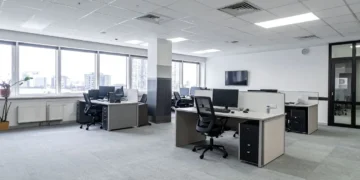- This year’s Coworking London Conference will take place June 27th and 28th.
- The event will focus on the intersection of real estate, technology, the future of work, wellbeing, and smart buildings.
- Ahead of the event, Jonathan Weinbrenn, Managing Director of BESpoke, shares his take on industry trends, nichification, and wellness.
eOffice’s Coworking London Conference is returning this year on June 27th and 28th, 2019.
Focusing on the intersection of real estate, technology and the future of work, the two-day conference takes place in numerous workspace locations and will address several key themes including specialisation of the industry, workplace wellbeing, and smart buildings.
Jonathan Weinbrenn, Managing Director of BESpoke, will be moderating a number of panels at the conference. Ahead of the event, Allwork.Space caught up with Jonathan to get his take on emerging trends, his concerns over ‘nichification’, the importance of workplace wellbeing, and his thoughts on the future of the flexible workspace industry.
Allwork.Space: This year you will be moderating a number of panels at Coworking London Conference. Which topics are you really looking forward to digging into?
Jonathan Weinbrenn: Now you’re really putting me on the spot! I think firstly, when you look at the breadth and depth of the content, it’s incredibly uplifting to see how the sector has matured. Going back even just a few years, you’d be hard pressed to see this level of contributors and topics, which is a wonderful endorsement of where we are now as a sector.
I’m really lucky that the panels I’m moderating are awash with industry experts with diverse backgrounds and insights. Whilst like most of us, I love a bit of data and market stats, I’m really keen to understand what lies behind the numbers. For example, what is the market sentiment, what case studies bring these stats to life and what personal experiences support the trends, models and predictions?
I’d love the audience to be able to leave the sessions with a mix of hard data and personal accounts that really impact them in unexpected ways — hopefully with a bit controversy thrown in for good measure too!
Allwork.Space: Specialisation is a major topic on the agenda and we’ve seen a lot of ‘niche’ spaces opening recently. Why is this happening, and do you expect it to continue?
Certainly in the short to medium term, yes. Specialisation is a natural development reflecting the evolution and growth of our sector. As the flexible workspace market gains more acceptance and market share, the offering has to adapt and become more sophisticated.
You see this across many other growth sectors, hospitality being a good example where many hotel chains or private members clubs target specific audiences and adjust their offering accordingly. For a sector like ours, still relatively in its infancy, this is simply one of a number of developments we will continue to experience as our market segment matures.
John Williams, Head of Marketing at The Instant Group, has coined the phrase “nichification” of the market which I think summarises this well and highlights how some operators are looking to differentiate their market appeal. Is it a positive development? I have mixed views on this.
Whilst it supports and reinforces our market impact, I have two main concerns:
- Firstly, as we strive to become more inclusive, diverse and community focused across society and our sector, does specialisation and ‘nichification’ actually smack more of elitism and exclusion?
- And secondly, purely from a business perspective, are there commercial risks in focusing on one kind of industry segment and putting all your eggs in one basket? Many of us have experienced significant economic cycles which have affected specific markets such as tech or financial services.
I have to confess though that I can point to examples across the BESpoke portfolio where this has occurred. For example in London we’ve created a community of transport and infrastructure clients occupying 13,000 sq ft in our space in Euston House — including Network Rail, HS2, Mace and Dragados. BESpoke specifically acquired space here to service the needs of these businesses who are delivering the £1.3bn contract with High Speed 2 Ltd (HS2) to redevelop Euston station. So, guilty as charged!
Allwork.Space: In addition to ‘nichification’, another major topic on the Conference agenda is wellbeing. In your view, how important is wellbeing in flexible workspaces? Which brands are really leading the pack when it comes to workplace wellbeing?
In the UK, we’ve just had Mental Health Awareness Week, which has focused heavily on the workspace. The correlation between health, wellbeing, happiness and productivity is widely accepted and our workspaces and behaviours should support these endeavours.
In London, I’ve been very impressed by Uncommon’s approach. Using the principles of activity based design, they seem to understand the relationship between environments and wellness. It’s a topic we at BE Group take really seriously, ensuring all of our customers benefit from key fundamental principles including offices with natural light, ergonomics, sit-stand desks, and biophilia — including roof terraces and outdoor spaces.
For us the subject of wellbeing is part of our wider commitment to our customers around corporate and social responsibility, including substantiality, where for example, 75% of our portfolio of just under one million square feet, now uses electricity from renewable sources.
Allwork.Space: Taking those ideas further, what are your thoughts on the future of work? What are some of the biggest developments that you think will gain traction over the next 2-3 years, and more?
There’s no doubt we are experiencing a period of structural change, with customer centricity at the heart of what we do. Space is increasingly being delivered as a service as opposed to a commodity, which is only a great thing for the consumer.
I spend a lot of my time talking to larger organisations, many multinationals, who are increasingly consuming our space as a service model, in favour of the more established routes to market. Many of them have already experienced, first hand, the benefit of serviced or coworking environments but now want to take this to the next level by personalising their space.
I can see our sector providing more and more customised workspaces, delivered on flexible terms, and still underpinned by the key pillars of customer service, connectivity, wellness and value.
We must never neglect the fact that work needs to be conducted in our spaces. I’m of the feeling that over the next 24 months, some operators will need to re-focus their attention away from providing gimmicks, distractions and unsafe environments, which are already starting to show the signs of unsound business models and potential legal issues pending.
Allwork.Space: What are some of the most significant trends you have seen during your time at BESpoke, and are seeing now?
As the war for talent intensifies, providing exceptional space and associated services is critically important. The ability for that workspace to reflect the client’s brand, image and culture whilst incorporating beautiful design, wellness elements and hospitality-led services acts as a differentiator for our clients. It enables them to stand out of the crowd with their employees and prospective employees and ultimately it becomes an extension of their employer proposition to them.
From a personal perspective, BESpoke’s clients all have a list of requirements that are specific to their needs. So the space we deliver in Euston, for example, is very different from the project we just rolled out for a professional services business in Belfast, which is very different to a project we are delivering for a DevOps teams in central London. It’s all about delivering on what the client needs.
Allwork.Space: At last year’s eOffice Conference, Elaine Rossall (among others) noted that landlords are seriously considering ways to enter the flexible space industry. What are your thoughts on this? Should operators embrace the opportunity to work more closely with landlords and property companies, or do their level best to differentiate and try to rise above the competition?
Great question! The traditional landlord market has moved beyond ‘considering’ entering the flex sector, and they are becoming significant players in it.
Unless we all become landlords ourselves, we need to create strategies to drive further growth. Our BESpoke portfolio includes a mix of freeholds and leases but for the majority of operators this isn’t the case. A healthy market and one that offers choice for the consumer will more than likely contain a vibrant mix and range of models.
Already we are seeing a blurring of the lines. The one dimensional market that existed fifteen years ago, offering either conventional or serviced office space only, is thankfully a distant memory. We now have a rich and diverse landscape of offerings, including alternative leasing models and profit share agreements. The real change will come when a widely accepted asset class definition is accepted by the institutional landlord market.
In the meantime, ‘flex’ means more than just offering shorter lease terms. Blending property knowledge, architecture and design, hospitality intensive service levels and capital risk are just some of the secret sauce ingredients we all live by. In my view, operators should embrace what they do best and focus on this element when they speak to their landlord partners in order to deliver the best customer solutions.



 Dr. Gleb Tsipursky – The Office Whisperer
Dr. Gleb Tsipursky – The Office Whisperer Nirit Cohen – WorkFutures
Nirit Cohen – WorkFutures Angela Howard – Culture Expert
Angela Howard – Culture Expert Drew Jones – Design & Innovation
Drew Jones – Design & Innovation Jonathan Price – CRE & Flex Expert
Jonathan Price – CRE & Flex Expert















